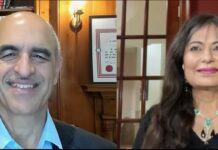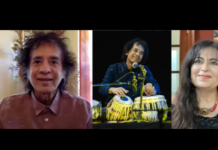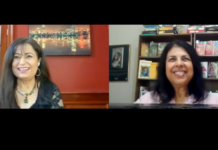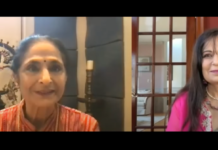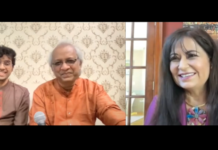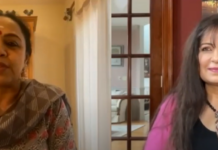
Albert Einstein once said “Try not to become a man of success but a man of value.” In this edition of Chai with Manju we were very fortunate to interview such an extraordinary couple of true value. Gururaj “Desh” Deshpande and his wife Jaishree started their life with little but scaled the heights of success, with their core values embedded in faith and family; their work ethics based on hard work, discipline and eternal enthusiasm; their lifestyle centered on simplicity and their message all about “giving back in life.” They have dedicated their life to enriching the lives of others in so many different ways and have truly given life to the words of David Viscott when he said: “The purpose of life is to discover your gift; the meaning of life is to give your gift away.” Desh and Jaishree sat down with INDIA New England at their spectacular home overlooking a golf course in Andover, Mass., and really lit up when talking about their kids and the joys of giving back in life.
Well known as the co-founder of tech giant Sycamore Networks, Desh Deshpande also founded Cascade Communications Corp. and is a founding investor in other companies such as Airvana, Cimaron, Webdialogs and Relicore. He is chairman at Tejas Networks and HiveFire, as well as president and chairman of Sparta Group LLC. He serves as a life-member of the MIT Corporation, and his support has made possible MIT’s Deshpande Center for Technological Innovation. He and his wife also has established the Deshpande Foundation. He has a bachelor’s degree in electrical engineering from the Indian Institute of Technology in Madras, a master’s degree in electrical engineering from the University of New Brunswick in Canada, and doctoral degree in data communications from Queens University in Canada.
First up is the interview with Desh, below. To read the second half of this Chai with Manju and the interview with Jaishree click here.
Desh Deshpande How did the name Desh come about? What happened to Gururaj?
My passport still says Gururaj. I was named after my grandfather [my father’s dad.] At home, everyone calls me Ravi. When I went to IIT in Chennai, they have the concept of only one name so everyone called me Deshpande first and then shortened it to Pondy. In 1973, when I first came to Fredericton, New Brunswick, for college, one of my professors thought that my name Deshpande was too long so he shortened it to Desh, and it has been Desh since then.
You have mentioned that you started your journey with $26.95 in your pocket in India. Do you remember your first big check and how did you spend it?
It was more like $8. In those days $8 was the limit in India and that’s why you often hear that many Indians then left India with $8 in their pocket. My first big check that I received was $100 in New Brunswick as a student which I spent on buying winter clothes and shoes as it was very cold there. September in Fredericton is like December in Boston.
You have founded so many companies. Which one is closest to your heart and why?
Cascade Communications. I was the entrepreneur there. I started that company whereas in many others I was the facilitator. Cascade was my baby. I was there 24/7 through all its up and downs (Cascade, a manufacturer of communications equipment, was founded by Deshpande in 1990 in Westford, Mass., and was acquired by Ascend Communications for $3.7 billion in 1997.)
There have been reports that through your investments, seed capital, and mentorship you have helped create or launch about 100 technology companies worldwide. Whom do you give credit for this grand success?
I give credit mostly to entrepreneurs. In 1980s, it was not common to be an entrepreneur, but nowadays being an entrepreneur has become a career choice. It is all about encouraging entrepreneurship.
After the initial public offering of Sycamore Networks, you were named the richest Indian on the planet, and after that you have helped launch so many other companies. What does money mean for you?
Money amplifies your intentions. Money is another tool to get done what you want to do. As we have had more money, we have also taken on very big projects and find that we need the help of everyone around us to solve the big problems that we are choosing to solve.
You once said that you valued hunger more than experience. Why hunger is so important? How do you rate yourself on that?
The philosophy that I follow in my life is that I want to be doing things that are exciting. However, what is exciting today becomes a chore after a while. When something becomes a chore, I give it up for two reasons: first it is not exciting and secondly there are a lot of other people in the world who will be excited about doing it and will do a better job. At times it may appear that it is best to hire an expert who has done it again and again to do the job. However, if that person is not excited, the job is better done by some one less experienced but more excited. Everyone contributes their best when they wake up in the morning and are excited about the day ahead of them.
What is the most fearless thing that you have ever done?
It was parachute jumping. The first time I twisted my knee. However, I was so excited I jumped again right away. Unfortunately, that damaged my knee and needed surgery, which also ended my short-lived parachute jumping.
What is the most fun thing that you have ever done in your life?
After our marriage, my wife and I decided to take 30 days and travel all over the United States. We had an old beat up Toyota Corolla. We packed a tent in the trunk and drove 8,000 miles in 30 days. During that tour, our most favorite place was the Grand Canyon. The Grand Canyon is spectacular. We hiked down the canyon, touched the water and hiked back the same day. Of course, we could barely walk the next day.
What has been your proudest moment in life?
When our kids graduated from MIT. Everything that the kids do becomes 1,000 times bigger than your own achievements.
You are known as a great philanthropist, you are associated with so many charities and great causes. What drives you and what has given you greatest satisfaction?
A lot of people become passionate about a cause for many reasons, maybe because something happened in their lives. For us, innovation and entrepreneurship created opportunities for us. Therefore, our philanthropic focus has been to promote innovation and entrepreneurship to create opportunities for others. We are using this approach to create opportunities to those in the top 30 percent of the society, like the initiative at MIT, as well as the “Social Innovation Sandbox” initiatives in India, Lowell/Lawrence and Canada to create opportunities for those at the bottom of the pyramid.
What is the biggest regret of your life?
No regrets. I feel very blessed. I truly believe that when things go wrong, you have an opportunity to do something about it. Regrets come if we do not do something about it. I think it is also very important not to get attached to any one idea so you wind up unable to move on if it does not work. A lot of people have regrets for not having done something that they should have done to those they loved. If there is something I feel I need to do, I jump on it right away. I want to live a life where at any given point I don’t owe anybody anything and nobody owes me anything.
What is the most important lesson that you have learned from your parents or family? And what is the most important lesson that you have taught your kids?
From my parents, I have learned simplicity and optimism. No matter what went wrong in our lives, they found something to be optimistic about. There was a lot of positive energy. Regarding kids, you cannot teach or preach to them about anything but they do learn from observing you and for that I give a lot of credit to my wife. Both my kids are very simple and do not draw their identity from their belongings or material goods. They do not carry that burden of materialism.
Who are your mentors? Who has inspired you the most?
When I was young, Mahatma Gandhi and Vivekananda inspired me. Those days I did not realize how entrepreneurial they were. Regarding mentors, I have been blessed to have many good people in my life. It is very important to be surrounded by good people and keep your eyes open for capabilities of people around you. You truly know your possibilities when you hang out with like-minded capable people. One of the persons that I enjoy spending time with is my brother-in-law Narayan Murthy. (Murthy is the co-founder of India-based Infosys.)
You have said that you constantly like to re-invent yourself. How do you see reinventing yourself in next 10 years?
I do believe in re-inventing one self. In fact, I believe in reinventing every four-to-five years. I had the first taste of it in 1988 when my first company Coral did not work out and I started Cascade six months later. Those six months gave me lot of time to think, plan and redo myself. Since then, I always plan my life in the four-to-five year phases. I always take some time and reinvent myself. In my last phase, I decided not to be an entrepreneur or CEO and just become a mentor.
My next focus is on nonprofits. By enabling other people to do things you create opportunities for them to do great things and in the process you reinvent yourself. It is a very important concept and I see that in a lot of successful people. Sometimes people who get lucky in life at a very young age get stuck and that is not a good situation. Reinvention is about stopping to do things that have become a chore even if it means starting again at the bottom of a ladder again.
If you don’t reinvent yourself, you get stuck. Sometimes you are on a trapeze that you don’t like, but you hang on for safety’s sake and feel stuck. In those situations you need the courage to let go and reinvent yourself. You need to have the ability to start again and take the risk of falling down. People sometimes complain a lot, get shackled and loose the excitement that life can offer.
His response to “Rapid-Fire Questions”:
Business is … making a difference.
Love is … compassion.
Money is … The ability to make a difference.
Fame is … Putting a smile on others’ face.
Secret of a good friendship is … not expecting anything.
Secret of a good marriage is … openness.
Secret of being a good boss is … commitment to a mission.
Secret of being a good dad … is not giving any advice.
My best quality is … optimism.
What I love most about my spouse is … genuine caring of others.
What I would love to change about my spouse is … nothing.
My favorite hobby is … It changes all the time. Right now, it is playing chess on iPad.
The book that I am currently reading is … “Break or Bend.”
What relaxes me most is … I am always relaxed no matter the situation.
My favorite singer is … Mohamad Rafi.
My favorite song is … “Kal Ho na ho.”
My most favorite travel destination is … New place every time.
My favorite movie is … “English Vinglish.”
My most favorite quote is … “Be the change that you wish to see in the world.” — Mahatma Gandhi.
My last words on Chai with Manju is … Sometimes in life it is easy to get disillusioned. All of us need to carve out a space where we can make a difference and feel good about ourselves. Unless we are happy with ourselves, we cannot make others happy.
Every life has a story, share it with INDIA New England over “Chai with Manju,” an exciting, innovative and riveting series featuring interviews with some of the most interesting, active, accomplished, amusing and entertaining men and women. Conducting the new interview series is Dr. Manju Sheth, a well-known physician at Beverly Hospital and INDIA New England’s 2011 Woman of the Year. She is also president of Indian Medical Association of New England. Sheth leads and is involved with numerous professional groups, charities and advocacy organizations, and will be profiling people who have compelling stories to tell. If you or someone you know has a compelling story to tell, you may contact Sheth at chaiwithmanju@gmail.com or INDIA New England Editor Martin Desmarais at MJD@IndiaNewEngland.com.





